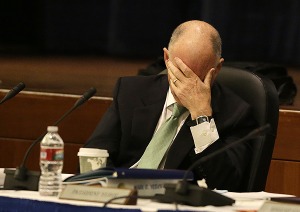Things are bad and getting better for California Republicans

By Steven Greenhut Watchdog.org
SACRAMENTO — You know the Republican Party has hit the bottom in California when the only chance for a non-leftist to win a statewide election is in the little-known race for state superintendent of public instruction — and the candidate that most Republicans favor isn’t even a Republican.
LAST ADULT IN SACRAMENTO: No matter how liberal Gov. Brown, he’s less crazy than the Legislature’s Democrats.
That nonpartisan race pits the current superintendent, a teachers’-union subsidiary named Tom Torlakson, against a charter-school president and well-known education reformer named Marshall Tuck. Both men are Democrats.
The GOP’s prospects in the other state constitutional races — governor, lieutenant governor, treasurer, attorney general, controller, secretary of state and insurance commissioner — are basically nil. Their prospects are so slim that GOP leaders haven’t been keen to support them, preferring instead to pin their hopes and dollars on some legislative seats where Republicans have a chance. This year’s situation is considered an improvement from recent years — so much so that it has led some observers to declare that the GOP might be making a comeback.
If this is a comeback, then imagine how bleak times have been for the GOP.
The governor’s race is a lock. Gov. Jerry Brown — known as Gov. Moonbeam to many folks outside California, reflecting his odd priorities from his previous stints as governor in the ’70s — is widely viewed by Republicans as the most conservative Democrat in Sacramento. A
s humorist Dave Barry would say, I am not making this up. Brown’s main actions as governor this time around have been leading the charge for a massive tax increase, pushing for a $69 billion high-speed-rail line that would connect Los Angeles to San Francisco (in theory) and protecting public-employee power and privilege.
He has signed laws requiring affirmative consent for sexual behavior in colleges and banning plastic bags throughout the state. His next-term agenda focuses on toughening the state’s first-in-the-nation and-trade system. But he hasn’t been as eager to raise taxes as his Democratic colleagues in the Legislature and he vetoes some of the wackiest bills that come to his desk — and that’s good enough to be the last adult standing in Sacramento.
Brown is one of the state’s best-known politicians ever, so there weren’t many takers on the Republican side. After Republicans panicked at the thought of a loose-lipped conservative Assemblyman named Tim Donnelly carrying the GOP torch, the party establishment backed Neel Kashkari, a liberal Republican whose main claim to fame was that he administered the widely loathed Troubled Asset Relief Program (TARP) at the federal Treasury Department. Kashkari has been trying to sound some conservative themes, but he has little money and is unlikely to come within 20 points of Brown.
The GOP’s brightest hope was Fresno Mayor Ashley Swearengin, who is running for controller. But some of Swearengin’s positions make Kashkari look like a right winger, including her support for Brown’s train to nowhere. Secretary of State candidate Pete Peterson, an academic, is a good, solid Republican who would actually be good at that particular job — and has gained his share of mainstream media endorsements. But, based on the latest polls, he will no doubt lose to Sen. Alex Padilla, who has championed fairly radical legislation. One of Padill’s bills would let judges expand Latino voting representation by unilaterally expanding the size of city councils — a move so out there that other prominent Latino activists convinced Brown to veto the legislation.
The rest of the GOP candidates are basically place holders, candidates with virtually no money or name recognition.
The GOP’s only hope is in the Legislature, and expectations are rather low. The Democrats had gained supermajorities in the Assembly and Senate, which enables them to raise taxes early and often given that California requires a two-thirds legislative vote for such hikes. The only thing that saved the GOP was hubris. The Senate Democrats lost three members in the last session. Sen. Rod Wright of Inglewood was convicted of perjury and voter-fraud charges and removed from office. Sens. Ron Calderon of Montebello was indicted by federal authorities on corruption charges and Sen. Leland Yee of San Francisco was indicted by the feds on charges including some related to gun trafficking. The latter two have been suspended and are gone but have still been collecting their paychecks.
On Tuesday, there are a few tight Assembly races and two tight Senate races. Those will determine whether the GOP will have any relevance in the coming legislative session. The GOP’s serious campaigns in legislative races is viewed by some as a sign of the party’s resurgence. But one Senate race and one Assembly race are in Orange County.
Long a conservative bastion, Orange County seats should mostly be safe for Republicans. Not any more. One of those seats, pitting Orange County Supervisor Janet Nguyen, a Republican, against former Assemblyman Jose Solorio, a Democrat, is in the most urban and Democratic part of the county. A Nguyen victory would be a GOP pick up and would probably deny the Democrats their longed-for supermajority provided the GOP can hold onto a tightly contested race in the San Joaquin Valley.
That would be good news, but the trends are moving against the party even in the OC.
The state’s relatively new top-two primary system pits the top two vote-getters from the primary, regardless of party, against each other in constitutional and legislative races. So more races will be like Tuck v. Torlakson. As the GOP fades into oblivion, Republicans may have to hope for similar intra-Democratic rivalries to find tolerable candidates in the future.
Steven Greenhut is California columnist for U-T San Diego and a contributor to Watchdog.org







